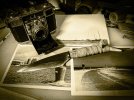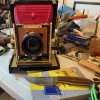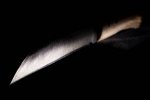- Joined
- Apr 8, 2020
- Messages
- 2,099
The BladeForums.com 2024 Traditional Knife is available! Price is $250 ea (shipped within CONUS).
Order here: https://www.bladeforums.com/help/2024-traditional/
Dusty parts camera; wanted to show off my dusty power winder!
The camera doesn't have a mirror...
View attachment 1573701
If you look good, you'll see a 28-45 Nikkor, Nikon's first wide angle zoom.

digital or film?I'm really loving this thread. As a newbie into the world of cameras, does anyone have any recommendations on a good starter or entry level option that can help get a foot in the door of the entire hobby? I'm sure like with everything there are many factors that go into this but anything would help as I literally know nothing lol Awesome pics from everyone as well! (Obviously)
I'm really loving this thread. As a newbie into the world of cameras, does anyone have any recommendations on a good starter or entry level option that can help get a foot in the door of the entire hobby? I'm sure like with everything there are many factors that go into this but anything would help as I literally know nothing lol Awesome pics from everyone as well! (Obviously)

Awesome stuff!! Thanks so much for the tips. I'm definitely gonna be spending a lot of time looking and reading before making any kind of decision. The whole artform of photography has always appealed to me and just recently I found myself wanting to get in and create these amazing shots and scenes I see in so many great photographs. Super excited for this mini journeyMy take:
it's not the camera. It's your eyeball. Get on a photo app (I'm on Flickr, link at the beginning of thread) and look at as many pics as you can. Decide what kind of photography appeals to you and work on that. That will help determine your gear.
For example a portrait photographer has different stuff compared to a landscape photographer. If just taking pics of knives, etc. your lenses are different again.
I've been out of digital for a while, but I think what's important is not the camera, but the glass. Make sure whatever brand you get has good lenses.
The cheaper DSLRs from Canon or Nikon are great starter cameras with decent packaged glass. Either way you want a camera that can go full manual so you can learn the exposure triangle: aperture, shutter and ISO. Learn this and you will be good to go. Well after you get composition.
It's not the camera, it's what YOU see through the viewfinder and how you manipulate the camera to create your vision.
Oh and lastly, get some good software. I use Adobe Lightroom and Photoshop occasionally.
If you don't shoot film, at least you can make your digital look like film!
View attachment 1574393


